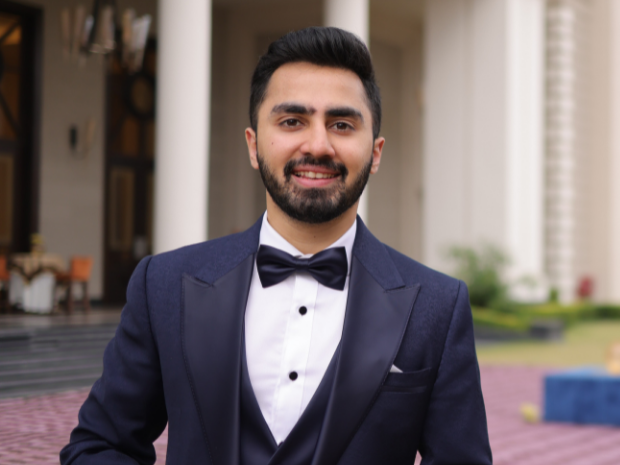
- Programme studied: MSc Economics and Management
- Year of Graduation: 2016
- LinkedIn profile
Meet our June Alum of the Month, Raj Snehil Juneja. Raj is the Vice President of Private Equity and Venture Capital at Khetal Advisors in India. He previously worked for the World Trade Organisation and at McKinsey before deciding to study a Master’s at LSE and change his career path.
Tell us about your career journey since graduating from LSE.
After graduation, I had a few career paths open to me. My consulting days prior to LSE had given me a valuable toolkit, which I was curious to experiment with. I did so by taking on roles that I felt I’d be interested in. To begin with, I found myself in Geneva, Switzerland at the World Trade Organisation for a short period.
Then I moved back to India, with one key learning from the experience – it matters a great deal to me how much I contribute to the problem being solved. It was a self realisation, on the basis of which I made most of my subsequent professional moves.
I began with another short-term stint at a Silicon Valley based VC fund called 500Startups. The experience got me closer to the startup ecosystem and a transaction atmosphere. I was then approached by my current firm – Khetal Advisors. Khetal is now a global multinational investment bank, with operations in India, Singapore and the US. My role here is advising venture capital/private equity fundraisers on the sellside, as well as cross border M&A transactions. Personally, I derive a lot of pleasure from impacting earlystage start-ups. I’d like to believe the founders I’ve been able to help out in turn will have an impact on the world.
I’ve been here close to four years now, and I'm extremely glad that the experiment I began after LSE got me into doing something I thoroughly enjoy - managing risk. Which is why in my next innings, I will be heading an early stage VC fund in India focussed on companies pursuing disruptive innovation.
How did your time at LSE influence your career journey?
The LSE experience humbles people – which comes with rubbing shoulders with extremely smart folk throughout year. This has been one of the greatest influences I carry with myself from my time at LSE. It drives you to listen more, ask better questions and in the process, become a better problem solver. The humility to acknowledge that everybody knows something that you don’t takes you a long way in professional and personal life.
You worked for McKinsey and Co. just before studying the MSc Economics and Management at LSE. What inspired you to do so, and why did you choose LSE?
While my time at McKinsey was very fulfilling, I always felt like I lacked industry application of my theoretical knowledge of the discipline. My decision to pursue this particular course, MSc Economics and Management, was to develop the tools for practical business application, while keeping my competence of Economics at its core. LSE’s reputation in Economics and its applications precedes itself, so needless to say it was my first choice. The partial scholarship made it a slam dunk!
You have been in the role of Vice President at Khetal Advisors in India for over three years. What is the most important lesson you have learned?
In business life, challenges are free-flowing and adaptability becomes key to progress. Two concepts that have been key in helping me develop better decision making are compartmentalisation and identifying temporal discounting.
The ability to compartmentalise has helped me greatly, to shut out another aspect of your work from negatively influencing what you are working on in the present. It has become an important skill in the attention economy we all live in.
Temporal discounting has helped me develop a long-term mindset for business problems, rather than just seeking instant gratification. To build trust with clients over a period of time will have greater rewards than looking for an instant sale.
How has your industry been affected by COVID-19 and what challenges do you forsee ahead?
The pandemic meant our business development had to be readjusted to align with new vectors. The challenge was in understanding which way the wind would blow, with respect to capital flows in the thick of uncertainty. During times of uncertainty, mental contrasting – visualising the obstacles keeping you from your goal are extremely effective. What we did was get into multiple conversations with investors in our network to understand their renewed outlook and took tactical calls pre-empting investment interests around certain key themes like edtech, consumer staples and cloud technologies. This worked out very well and has helped us bounce back stronger.
The challenges I forsee are mostly with respect to equitable competition across industries since the pandemic has exacerbated such inequities. Increased technological adoption is great, but if its lopsided to advantage the larger tech giants, it will stunt startup ecosystems. But otherwise, I believe the pandemic will bring more opportunities for young entrepreneurs to solve problems for the global audience. In fact, as an early-stage VC investor, I’m banking on this!
This year we are celebrating the 125th anniversary of LSE. What is your fondest memory whilst you were studying with us?
I think my fondest memories in general were working on group business presentations at NAB. The environment, the energy, the ideas made for a very stimulating experience week in and week out. I worked on a combined presentation on FDI in Emerging Markets by Professor Saul Estrin, which we worked day in and out for while juggling interviews and exam preparation. That was a special one since by the end of it, not only had we gotten a distinction grade on the project, but all the members on that group had also secured jobs.